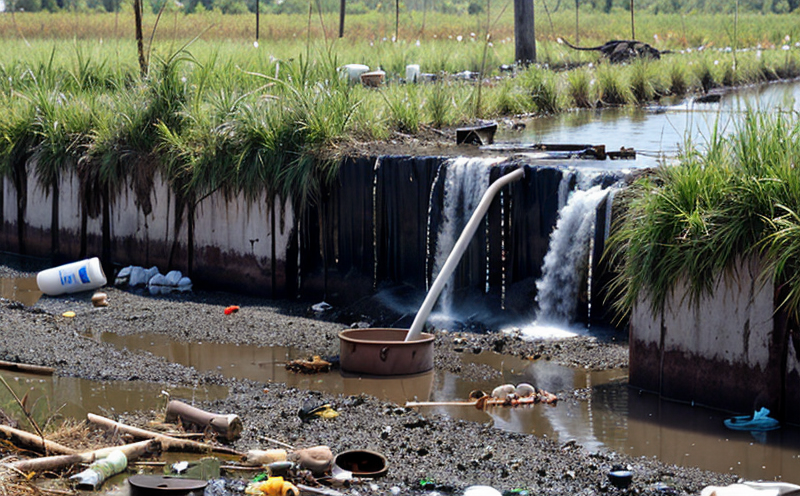Ethanol Pollutant Testing
The testing of ethanol pollutants in the environment is a critical process that ensures compliance with local and international standards, safeguarding public health, and protecting ecosystems. Ethanol, commonly used as a fuel additive or in industrial applications, can pose risks when improperly managed. Polluted water bodies, soil, and air can lead to significant environmental degradation and human health hazards.
Ethanol pollutants are often present in various forms such as ethyl alcohol, methanol, and other related compounds. The testing process involves several stages including sample collection, preservation, and preparation followed by analysis using advanced analytical techniques like GC (Gas Chromatography), HPLC (High-Performance Liquid Chromatography), and FTIR (Fourier Transform Infrared Spectroscopy).
For accurate ethanol pollutant testing, it is crucial to follow stringent protocols. Sample collection should be done in airtight containers to prevent contamination by other substances. Preservation methods such as addition of antioxidants or acids can help stabilize the sample. Once collected and prepared, the samples are analyzed for parameters like concentration levels, presence of impurities, and degradation products.
International standards such as ISO 17025 govern the quality requirements for testing laboratories. Compliance with these standards ensures reliable results that are accepted globally. Laboratories must also have qualified personnel trained in handling hazardous substances safely.
The importance of ethanol pollutant testing cannot be overstated, especially given its widespread use across industries ranging from automotive to pharmaceuticals. Properly conducted tests not only meet regulatory requirements but also provide valuable data for improving product formulations and processes.
| Parameter | Method | Units |
|---|---|---|
| Ethylic Alcohol Concentration | Gas Chromatography (GC) | % v/v |
| Methanol Content | HPLC | % w/w |
| Water Solubility | Shaking Flask Test | (mg/L) |
| Toxicity Levels | LC50 Measurement | (µg/mL) |
This table outlines some key parameters and methods used in ethanol pollutant testing. Understanding these aspects helps stakeholders make informed decisions regarding environmental protection measures.
Why It Matters
Ethanol pollutant testing is essential for several reasons:
- To ensure compliance with environmental regulations that protect natural habitats and human health.
- To support R&D efforts aimed at developing cleaner technologies and more efficient production processes.
- To enhance supply chain transparency by providing third-party verification of product quality.
- To mitigate risks associated with improper disposal or management practices within industrial settings.
By conducting thorough ethanol pollutant tests, organizations demonstrate their commitment to sustainability and corporate responsibility. This proactive approach fosters trust among stakeholders and contributes positively towards achieving long-term environmental goals.
Industry Applications
- Agricultural industries use ethanol as a biofuel additive which can lead to soil contamination if not managed properly.
- In the pharmaceutical sector, ensuring purity levels of ethanol used in drug formulations is vital for patient safety.
- The food industry may employ ethyl alcohol as an ingredient; testing ensures it meets stringent hygiene standards.
Table:
| Industry | Potential Pollutants | Risk Factors |
|---|---|---|
| Agriculture | Ethylic Alcohol, Methanol | Improper storage leading to runoff into nearby water sources. |
| Pharmaceuticals | Pesticides from agricultural inputs | Contamination during manufacturing processes affecting end products. |
| Food | Microbial growth in improperly stored containers | Hazardous residues impacting consumer health. |
The above table highlights potential pollutants and risk factors specific to different industries. Identifying these risks early allows for targeted mitigation strategies, thereby reducing overall environmental impact.
Eurolab Advantages
Ethanol pollutant testing at Eurolab offers numerous advantages:
- State-of-the-Art Facilities: Our laboratories are equipped with cutting-edge instruments capable of delivering precise results.
- Experienced Professionals: Our team comprises highly skilled experts who stay updated on the latest developments in analytical techniques.
- Comprehensive Reporting: Detailed reports are provided along with actionable insights to help clients address issues promptly.
- Dedicated Support: Round-the-clock customer support ensures seamless communication and quick resolution of any queries.
We pride ourselves on offering unbiased, accurate, and timely ethanol pollutant testing services. Whether you're dealing with compliance issues or seeking to enhance product quality, Eurolab is your trusted partner in environmental protection.





